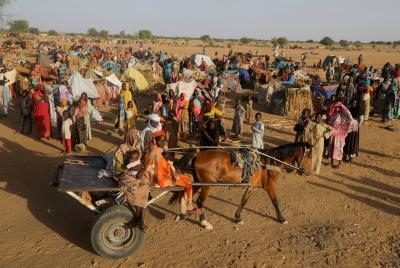Relative calm prevailed in the Sudanese capital, Khartoum, on Saturday morning as a 24-hour ceasefire, brokered by the United States and Saudi Arabia, came into effect. This ceasefire allows for humanitarian aid to reach affected areas and gives residents a chance to catch their breath from the pressures of intense fighting.
The "short" ceasefire follows a series of ceasefire agreements that were violated by the two warring parties — the Sudanese army and the Rapid Support Forces — whose power struggle has escalated into violence over the past eight weeks, leading to a humanitarian crisis.
Before the ceasefire took effect at 6 AM (04:00 GMT), residents reported the launch of anti-aircraft missiles south of Khartoum and in the East Nile area across the river, which also experienced airstrikes. The United States and Saudi Arabia expressed their disappointment regarding the violations in a statement announcing the latest ceasefire and threatened to postpone talks, which had been ongoing indirectly recently, if fighting continued.
The U.S. State Department confirmed late Friday their support for a platform called the Sudan Conflict Observatory to publish results of satellite monitoring of the fighting and ceasefire violations. An initial report from the observatory documented "widespread" and targeted destruction of water, electricity, and communication facilities.
It also documented eight "systematic" attacks to deliberately burn properties that destroyed villages in Darfur, as well as several attacks on schools, mosques, and other public buildings in the city of Geneina in the far west of the country, which has seen violent assaults by local groups amid communication disruptions.
The past week since the last ceasefire ended on June 3 witnessed intense fighting, with some clashes occurring around key military bases. The Rapid Support Forces claimed to have seized a weapons manufacturing complex south of Khartoum. The U.S. and Saudi Arabia again expressed their disappointment over the violations in the announcement of the latest ceasefire and threatened to postpone talks if fighting persisted.
The United Nations stated that more than half of Sudan's population will need assistance this year due to the fighting, as most hospitals in conflict areas have ceased operations and food supplies have dwindled in many regions. The previous ceasefire allowed for some humanitarian aid to reach the affected areas, but relief agencies reported ongoing obstacles due to fighting, bureaucratic restrictions, and looting. Fighting has displaced over 1.9 million people, with more than 400,000 crossing into neighboring countries.




